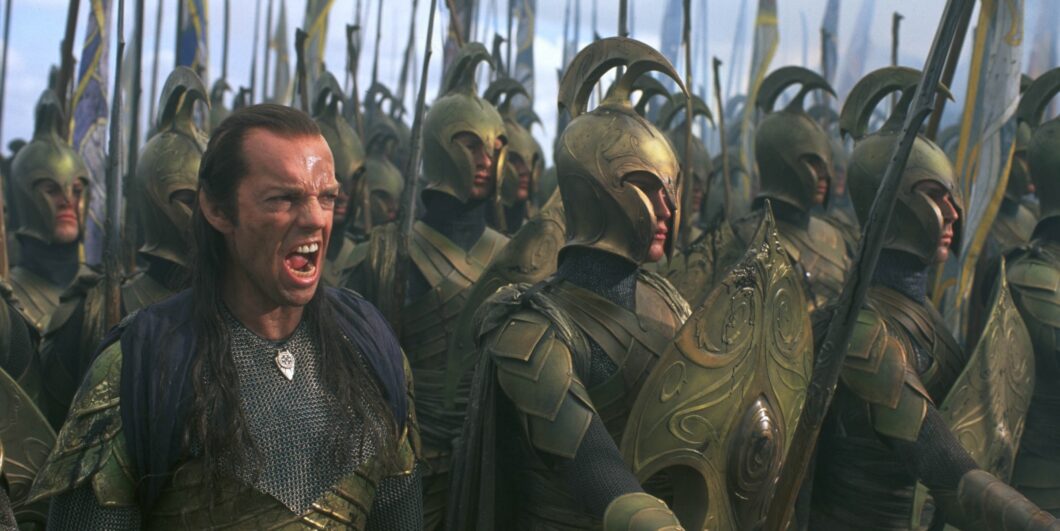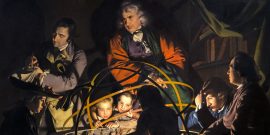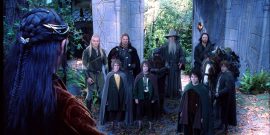Many of the problems that liberalism’s critics attribute to a political philosophy are actually the outgrowth of otherwise salutary scientific development.
Clausewitz in Middle-Earth
J. R. R. Tolkien’s The Lord of the Rings is a story about war. In the foreword to the second edition, Tolkien explains, “It was during 1944 that, leaving the loose ends and perplexities of a war which it was my task to conduct, or at least report, I forced myself to tackle the journey of Frodo to Mordor.” Although it was largely written during the most terrible of modern wars, Tolkien feels medieval to us: it is all swords and horses, mythical creatures, and magical talismans.
A long time ago, Plato warned that appearance and reality are not always the same. Tolkien had extensive personal experience with modern warfare as a veteran of the Somme, and I think in important and defining ways that LotR is truly a story of modern war. To explain, I will show how it dovetails with On War, by Carl von Clausewitz (1780–1831). Clausewitz, a Prussian veteran of many Napoleonic battles—including, amazingly, both Borodino and Waterloo—penned the classic Western reflection on war.
Many of Clausewitz’s concepts operate in LotR. For example, Tolkien is very attentive to the role of geography in generating friction, and also to that other source of friction, the problem of knowledge. I will only explore the place of Clausewitz’s ideas about absolute war, the center of gravity, and the theatre of war. Together they reveal something surprising about what kind of war story is LotR.
Absolute War
On War is a classic of Enlightenment thinking. It belongs in the same genre as Adam Smith’s On the Nature and Causes of the Wealth of Nations. Like Smith, inspired by the science of the period, Clausewitz enquires into the causality of combat power. One of his theses is that different political orders cause wars to vary in character. By profession, Tolkien was a professor of medieval literature, and early critics spoke magnificently of LotR as the last great medieval romance. Can an Enlightenment classic illuminate a tale of knights, ladies, and wizards?
About the Middle Ages, Clausewitz says, “cohesion in the state was never weaker or the individual so independent. It was the combination of these factors that gave medieval wars their special character.” In consequence, wars in the Middle Ages “were waged relatively quickly; not much time was wasted in the field; but their aim was usually to punish the enemy, not subdue him. When his cattle had been driven off and his castles burned, one could go home.”
Not the thieving of cattle, but the annihilation of the enemy figures in LotR. Universal slavery and destruction hang in the balance. Tolkien’s Huorns—a breed of quasi-sentient trees—hunt down and annihilate Saruman’s army while the Ents bring ruination to Orthanc, his fortress. Defeated, both Sauron and Saruman are vapourized by the gods, and the particles are scattered to the winds. Tolkien: “If the One Ring was actually unmade, annihilated, then its power would be dissolved, Sauron’s own being would be diminished to vanishing point, and he would be reduced to a shadow, a mere memory of malicious will.” Great forces are at work in LotR; it is not a medieval epic, but modern.
Clausewitz argues that on account of the timidity of human nature, most war devolves into “observation war.” “Generally it is not a case in which two mutually destructive elements collide, but one of tension between two elements, separate for the time being, which discharge energy in discontinuous, minor shocks.” On the surface, the parley between Gandalf and the Mouth of Sauron puts the War of the Ring in the conventional military and political register of “minor shocks.”
After the victory of the allies at the Battle of the Pelennor Fields, heralds of the West demand to speak to Sauron. Before Sauron’s fastness at Mordor, they shout: “Justice shall be done upon him. For wrongfully he has made war upon Gondor and wrested its lands. Therefore the King of Gondor demands that he should atone for his evils.” This is a bluff, for though Sauron has lost a battle, he still has a vast army and eager allies. Full of bravado, his emissary, the Mouth of Sauron—an unknown man of great stature in the service of the Dark Lord—proffers terms: the forces of the West are to withdraw behind the River Anduin forsaking all lands to the east of the river. Communities to the west of the river must demilitarize and pay tribute to Sauron, but otherwise, they will be free to manage their own affairs.
This is conventional diplomacy after conflict, settling the fate of lands, which is always an issue in war. Clausewitz explains: “The object of the attack is the possession of the enemy’s territory.” Yet, not for a moment is Gandalf persuaded of the sincerity of the terms. He knows the outcome of losing the war is that Sauron “would be their tyrant and they his slaves.” LotR is about allies loving liberty and parrying an extractive war of conquest. Gandalf warns Frodo of the stakes: “Hobbits as miserable slaves would please him far more than hobbits happy and free.”
Gandalf knows there is no truck and barter with Sauron, a spirit of malice, who is wagering his all in the war. In the history of warfare, Sauron’s staking it all is rare. Clausewitz: “Even a royal commander had to use his army with a minimum of risk. If the army was pulverized, he could not raise another, and behind the army there was nothing.”
Clausewitz argues that it was Napoleon who inaugurated total resource war. He gives “the pure concept of war” a chilling moniker. Contrasting the way of war in the Seven Years’ War with the Napoleonic Wars, Clausewitz writes, “The generals opposing Frederick the Great were acting on instructions—which implied that caution was one of their distinguishing characteristics. But now the opponent of the Austrians and Prussians was—to put it bluntly—the God of War himself.” Sauron is not an allegory for Bonaparte, but their way of “absolute war” is the same. LotR is a depiction of the modern “pure concept of war.” This is why the war drains all from Frodo, the Ring-bearer.
A Single Center of Gravity
Clausewitz recommends war planners identify “the ultimate substance of enemy strength,” to find the “single center of gravity” of the enemy’s combat power. For Sauron, this is the One Ring and its place of origin, the fires of Mount Doom. Gandalf and Lord Elrond are clear-eyed: the West’s only hope is to get the Ring to Mount Doom and have it thrown into its fires. Clausewitz approves: “In war, the subjugation of the enemy is the end, and the destruction of his fighting forces the means.” About this concept, Clausewitz writes, “A center of gravity is always found where the mass is concentrated most densely. It presents the most effective target for a blow; furthermore, the heaviest blow is that struck by the center of gravity. The same holds true in war.” The Ring is the center of gravity of Sauron’s army, and, for the allies, Frodo is most able to deliver the “heaviest blow.”
Sauron is not an allegory for Bonaparte, but their way of “absolute war” is the same.
The rootedness of Hobbits, twinned with Frodo’s patience and open, compassionate spirit, is “where the mass [of the West] is concentrated most densely.” Rootedness secures cohesion—a property under constant threat in war—and the moral forces so basic to combat power, according to Clausewitz. This is what leads Elves to dub Frodo “Elf-friend.” Frodo sets out on his quest for love of the Shire, but it is his gentleness towards Gollum, and his ability to grasp the higher things hinted at in Gandalf’s words about Sméagol, that gain final victory. It is a strategic advantage to the West that they know Sauron’s center of gravity, but he is ignorant of theirs. He only learns of the existence of the Shire late, once the die of the war is already cast, and he takes no time to learn its character, preoccupied as he is with finding the Ring’s whereabouts. The same ignorance undermines Saruman. He mocks Gandalf for his interest in the ways of the Shirelings, but it is Hobbits that trigger the Last March of the Ents.
In a letter, Tolkien says of Frodo:
Frodo undertook his quest out of love. … His real contract was only to do what he could, to try to find a way, and to go as far on the road as his strength of mind and body allowed. He did that. I do not myself see that the breaking of his mind and will under demonic pressure after torment was any more a moral failure than the breaking of his body would have been—say, by being strangled by Gollum, or crushed by a falling rock.
Clausewitz says all war is a series of duels and it is striking that Tolkien depicts the duel between Sauron and Frodo in terms of gravity. Long time bearer of the Ring, Gollum goes about on all fours—“Look at him! Like a nasty crawling spider on a wall. … Like some large prowling thing of insect-kind”—and Frodo is drawn to the ground, increasingly hunched over by the weight of the Ring about his neck. “In fact with every step towards the gates of Mordor Frodo felt the Ring on its chain about his neck grow more burdensome. He was now beginning to feel it as an actual weight dragging him earthwards.” Ultimately, Frodo will be prostrate on the ground, unable any longer to contend with the Dark Lord. This is when Sam, the gardener—expert in raising things from the soil—lifts Frodo up and carries him to Mount Doom.
Theatre of War
“In the days before Louis XIV, the movements of an army were not yet connected with the concept of a theatre of war.” Another modern military concept explains how Sauron has fortified Mordor. Clausewitz explains, “But the theater of war considered as a fighting force itself, with all its fortresses, its natural obstacles, and its sheer expanse of surface, is immobile. It may thus either be activated in stages. … In that case, every influence that an army’s theatre of war can exert to weaken the enemy will become effective.”
Mordor is a creeping hellscape of malignancy. Relaying the history of the Dead Marshes to Sam and Frodo, Gollum says, “But the Marshes have grown since then, swallowed up the graves; always creeping, creeping.” Sam almost gets snared: “He fell and came heavily on his hands, which sank deep into sticky ooze, so that his face was brought close to the surface of the dark mere. … Wrenching his hands out of the bog, he sprang back with a cry.” Closer to Mount Doom still, the party leaves behind them “the arid moors of the Noman-lands,” where “the air, as it seemed to them, grew harsh, and filled a bitter reek that caught their breath and parched their mouths.” Overwhelmed by disgust—“’I feel sick,’ said Sam. Frodo did not speak” as “the gasping pits and poisonous mounds grew hideously clear”—they stumble through Sauron’s vertigo-inducing “circumvallations:”
Frodo looked around in horror. … Even to the Mere of Dead Faces some haggard phantom of green spring would come; but here neither spring nor summer would ever come again. Here nothing lived, not even the leprous growths that feed on rottenness. The gasping pools were choked with ash and crawling muds, sickly white and grey, as if mountains had vomited the filth of their entrails upon the land.
Sauron’s malignity has rendered the land disgusting, its “crawling muds” breaking up and disorienting the march of any who would enter the defenses of his theatre.
In Flanders Fields
Tolkien’s is a modern tale of war. It is an example of Clausewitz’s absolute war, where Sauron and Saruman wager all their resources. In consequence, defeat is total. Slain, Saruman’s spirit leaves his body and shapes into a mist: “For a moment it wavered, looking to the West; but out of the West came a cold wind, and it bent away, and with a sigh dissolved into nothing.” Frodo is emptied, also. “I have been too deeply hurt, Sam. I tried to save the Shire, and it has been saved, but not for me.”
In “the War of the Ring,” Frodo and the Shire were the West’s single center of gravity. As Frodo departs Middle-earth to find solace in the Blessed Realm, two tasks fall to Sam, the new Mayor of the Shire. In Frodo’s parting speech, Sam is told to be a reminder to others of the “Great Danger” of universal slavery that nearly came to pass. This will help Hobbits to “love their beloved land all the more.” Sam is also dubbed “the most famous gardener in history.” In a counter-image to Sauron’s theatre of war, Sam reseeds lands laid waste by war. The “bulwark of the West” is to be good, rich farmlands, a new Flanders. Perhaps from experience, in Tolkien’s vision, we hear an echo of Clausewitz’s idea that an active theatre of war makes an army’s retention of cohesion “more complicated.” The phenomenon of an active theatre of war, says Clausewitz is, “strongest in Flanders, Holstein, and other areas, where the land is cut up by numerous ditches, fences, hedges, and walls, and dotted with great numbers of single houses and clumps of tress.”
LotR is a compelling war story because it tracks Clausewitzian causality, making high-minded compassion the center of gravity and the greening of land the theatre of war. In Frodo and Sam, the spiritual and material forces basic to modern combat power combine.



